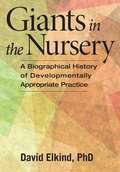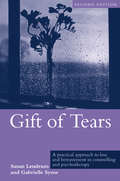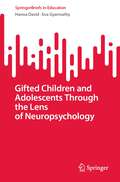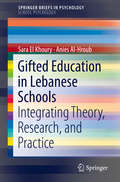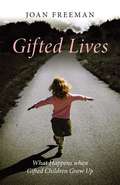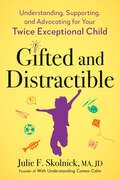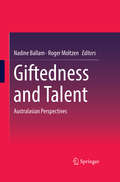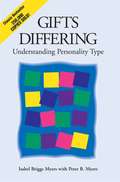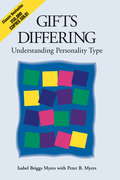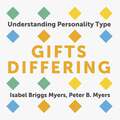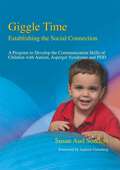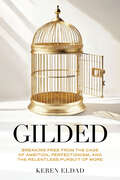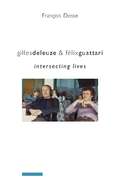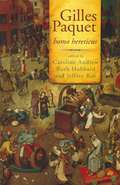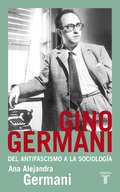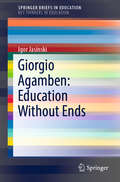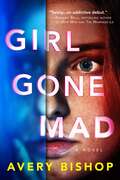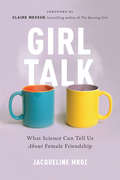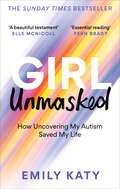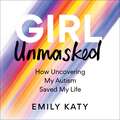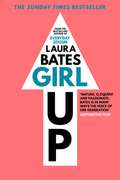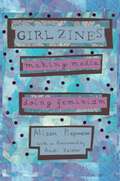- Table View
- List View
Giants in the Nursery
by David ElkindExamine the evolution of developmentally appropriate practice with this biographical history of early childhood education. This book explores the theory's progression—from its beginnings in writings of sixteenth- and seventeenth-century philosophers, its experimental implementation by eighteenth- and nineteenth-century practitioners, and its scientific grounding in contemporary theory and research—and includes biographical sketches and perspectives of eleven philosophical, pedagogical, and theoretical figures—the giants—in this evolution. David Elkind, PhD, is the best-selling author of more than twenty books and a well-known early childhood expert who has appeared on shows including Today Show, CBS Morning News, 20/20, Dateline, Donahue, and Oprah.
Gift of Tears: A Practical Approach to Loss and Bereavement in Counselling and Psychotherapy
by Susan Lendrum Gabrielle SymeThis thoroughly revised and updated edition of Gift of Tears includes new research and examples of recent events to help illustrate the effects of loss. Containing a strong practical element, the book guides the reader through the process of contemplating and eventually confronting their own relationship to loss. Written by experienced counsellors and psychotherapists, the book contains candid and readable discussions of central issues, including: * how to understand and work with anger and guilt* attachment patterns and loss* historical changes in attitudes to death and bereavement * death as a particular form of loss. Gift of Tears is intended for anyone who finds they have to cope, in the course of their daily lives, with the grief of others. It will prove invaluable to counsellors, therapists, mental health professionals and all those helping the bereaved.www.bereavementarena.com
Gifted Children and Adolescents Through the Lens of Neuropsychology (SpringerBriefs in Education)
by Hanna David Eva GyarmathyThis book addresses a wide range of issues situated in the core of theoreticians’ and clinicians’ work in the field of giftedness. It gathers practical issues, relevant for the lives of many gifted children, adolescents and adults, from a neuropsychological point of view. By studying the basic questions in gifted education through a neuropsychological lens, this book aims to establish a uniform new way for the treatment of gifted children with social or emotional difficulties, learning disabilities, physical limitations, or psychological and psychiatric disorders. This book helps educators and mental-health professionals to obtain a deeper understanding of the neurological system and its role in learning. This includes memory, knowledge-processing, making connections, and the implications on the cognitive, emotional, and physical aspects – all of which play major roles in the life of each gifted child and adolescent. By acquiring this new knowledge, more teachers, counsellors, psychologists and psychiatrists will be able to help individuals materialize their giftedness, while preserving their mental health and productivity.
Gifted Education in Lebanese Schools: Integrating Theory, Research, And Practice (SpringerBriefs in Psychology)
by Anies Al-Hroub Sara El KhouryThis Brief discusses research about gifted education in Lebanese schools. It provides an overview of the latest theories, definitions, and practices used to identify gifted students in Lebanese schools. Chapters begin by providing background information on the status of gifted education in Lebanon and the challenges gifted Lebanese children face. Subsequent chapters discuss recent and relevant international definitions of giftedness as well as common misconceptions and underrepresentation of giftedness. The Brief presents research study findings on the cultural definition of giftedness in the minds of Lebanese teachers. It also presents findings on current practices used to identify gifted learners in Lebanese schools. It concludes with recommendations from the teachers that participated in the reported study as well as the authors’ proposal for a Lebanese elementary school policy for identification of gifted students. Gifted Education in Lebanese Schools is an informative resource for researchers, professionals, practitioners, and graduate students in the field of school psychology, educational psychology, gifted and special education, and social work.
Gifted Lives: What Happens when Gifted Children Grow Up
by Joan FreemanThis book reveals the dramatic stories of twenty outstandingly gifted people as they grew from early promise to maturity in Britain. Recorded over the last thirty-five years by award-winning psychologist, Joan Freeman, these fascinating accounts reveal the frustrations and triumphs of her participants, and investigates why some fell by the wayside whilst others reached fame and fortune. These exceptional people possess a range of intellectual, social and emotional gifts in fields such as mathematics, the arts, music and spirituality. Through their particular abilities, they were often confronted with extra emotional challenges, such as over-anxious and pushy parents, teacher put-downs, social trip-wires, boredom and bullying in school and conflicting life choices. Their stories illustrate how seemingly innocuous events could have devastating life-long consequences, and confront the reader with intriguing questions such as: Does having a brilliant mind help when you are ethnically different or suffering serious depression? How does a world-class pianist cope when repetitive strain injury strikes, or a young financier when he hits his first million? What is the emotional impact of grade-skipping? Joan Freeman’s insights into the twists and turns of these lives are fascinating and deeply moving. She shows us that while fate has a part to play, so does a personal outlook which can see and grab a fleeting chance, overcome great odds, and put in the necessary hard work to lift childhood prodigy to greatness. Readers will identify with many of the intriguing aspects of these people’s lives, and perhaps learn something about themselves too.
Gifted and Distractible: Understanding, Supporting, and Advocating for Your Twice Exceptional Child
by Julie F. SkolnickA practical, research-based guide that demystifies giftedness and learning differences in order to help &“twice exceptional&” children thrive.Does your child exhibit giftedness and behavioral issues like meltdowns, power struggles, and difficulty relating to their peers? Are they out-of-the-box thinkers requiring different teaching and learning methods? It&’s a widely held misconception that intellectual ability and social and emotional success go hand in hand. In fact, &“twice exceptional&” kids—those who are gifted and have simultaneous learning differences like ADHD, Autism, or dyslexia—are often misunderstood by parents, teachers, and themselves. This much-needed and empowering guide reveals the unique challenges these remarkable kids face, and offers strength-based, hands-on strategies for understanding, supporting, and advocating for twice exceptional kids. In a world that labels them lazy, scattered, attention-seeking, and a problem that can&’t be solved, these tools will help you reimagine the world through your child&’s unique perspective—so you can help them thrive.
Giftedness and Talent
by Nadine Ballam Roger MoltzenThis book brings together recent postgraduate research in the broad area of giftedness, talent development and gifted education conducted across New Zealand and Australia. It addresses the significant demand for research in the field undertaken outside the United States and offers valuable practical insights. Divided into 14 chapters, the book explores giftedness and talent in a diverse range of socioeconomic cohorts and contexts, including examinations of gender, race and ethnicity. Though primarily intended for practitioners, it will also benefit undergraduate and postgraduate students, researchers and educators in New Zealand, Australia and beyond.
Gifts Differing: Understanding Personality Type
by Peter B. Myers Isabel Briggs MyersThe classic work on the 16 major personality types as identified in the Myers-Briggs Type Indicator.
Gifts Differing: Understanding Personality Type
by Peter B. Myers Isabel Briggs MyersLike a thumbprint, personality type provides an instant snapshot of a person's uniqueness. Drawing on concepts originated by Carl Jung, this book distinguishes four categories of personality styles and shows how these qualities determine the way you perceive the world and come to conclusions about what you've seen. It then explains what they mean for your success in school, at a job, in a career and in your personal relationships. For more than 60 years, the Myers-Briggs Type Indicator (MBTI) tool has been the most widely used instrument in the world for determining personality type, and for more than 25 years, GIFTS DIFFERING has been the preeminent source for understanding it.
Gifts Differing: Understanding Personality Type - The original book behind the Myers-Briggs Type Indicator (MBTI) test
by Peter B. Myers Isabel Briggs MyersLike a thumbprint, personality type provides an instant snapshot of a person's uniqueness. Drawing on concepts originated by Carl Jung, this book distinguishes four categories of personality styles and shows how these qualities determine the way you perceive the world and come to conclusions about what you've seen. It then explains what they mean for your success in school, at a job, in a career and in your personal relationships. For more than 60 years, the Myers-Briggs Type Indicator (MBTI) tool has been the most widely used instrument in the world for determining personality type, and for more than 25 years, Gifts Differing has been the preeminent source for understanding it.
Gifts Differing: Understanding Personality Type - The original book behind the Myers-Briggs Type Indicator (MBTI) test
by Peter B. Myers Isabel Briggs MyersThe original source for understanding the Myers-Briggs Type Indicator® (MBTI®) assessment.For more than 60 years, the Myers-Briggs Type Indicator (MBTI) tool has been the most widely used instrument in the world for determining personality type, and for more than 25 years, Gifts Differing has been the preeminent source for understanding it.Like a thumbprint, personality type provides an instant snapshot of a person's uniqueness. Drawing on concepts originated by Carl Jung, this book distinguishes four categories of personality styles and shows how these qualities determine the way you perceive the world and come to conclusions about what you've seen. It then explains what they mean for your success in school, at a job, in a career and in your personal relationships. For more than 60 years, the Myers-Briggs Type Indicator (MBTI) tool has been the most widely used instrument in the world for determining personality type, and for more than 25 years, Gifts Differing has been the preeminent source for understanding it.(P)2017 John Murray Press
Giggle Time - Establishing the Social Connection: A Program to Develop the Communication Skills of Children with Autism
by Susan Aud SondersGiggle Time is a step-by-step program for parents, teachers and other professionals to help develop the non-verbal, verbal and social reciprocity skills of children with autism. It describes in accessible detail how to communicate with children with autism and gives clear instructions on "how to" techniques for developing language skills. Specifically addressing developmental delays, Giggle Time helps to lay the necessary framework for future language growth by turning the actions the child initiates into interactions with meaning. This is a user-friendly guide, packed full of fun and child-centered exercises that can be carried out at home or in the classroom.
Gilded: Breaking Free from the Cage of Ambition, Perfectionism, and the Relentless Pursuit of More
by Keren EldadBreak Free from the Trap of Ambition &“I highly recommend Keren Eldad&’s new book, GILDED, which comes at a time when many people are struggling with the strictures of ambition and perfectionism. Keren&’s approach gives readers the power to break free from the trance of pursuing &‘more&’ and celebrate the present moment.&” –– Gay Hendricks, NYT bestselling author of The Big Leap GILDED by Keren Eldad is the go-to guide for overachievers and high performers who feel trapped in the endless cycle of chasing success. If you're ready to break free from perfectionism anxiety and discover true fulfillment, this book will guide you toward a life of authenticity and freedom. Are you an overachiever who feels unfulfilled despite your success? For those driven by ambition, perfectionism, and a relentless pursuit of more, it&’s easy to lose sight of what truly matters. In GILDED, Keren Eldad explores why so many high performers—whether C-suite executives or go-getters—feel trapped by the very success they sought, finding themselves unfulfilled despite outward achievements. Do you want to break free from the pressure of always needing more? If you&’re tired of perfectionism anxiety and constantly moving the goalposts of success, GILDED offers a fresh perspective. Drawing from executive coaching and personal experiences, Eldad provides practical strategies to help you step out of the gilded cage, stop chasing hollow victories, and start living a life of genuine abundance and fulfillment. Inside, you&’ll find: Actionable strategies to overcome perfectionism anxiety and embrace self-reflection for lasting personal growth. Practical insights for high performers and leaders who seek purpose beyond external success. Tools from executive coaching designed to help you redefine your ambitions and live authentically. If you liked other leadership development books such as The Coaching Habit, High Performance Habits, or Why Smart, Creative and Highly Sensitive People Hurt, you&’ll love GILDED.
Gilles Deleuze and Félix Guattari: Intersecting Lives
by Deborah Glassman Francois DosseIn May 1968, Gilles Deleuze was an established philosopher teaching at the innovative Vincennes University, just outside of Paris. Félix Guattari was a political militant and the director of an unusual psychiatric clinic at La Borde. Their meeting was quite unlikely, yet the two were introduced in an arranged encounter of epic consequence. From that moment on, Deleuze and Guattari engaged in a surprising, productive partnership, collaborating on several groundbreaking works, including Anti-Oedipus, What Is Philosophy and A Thousand Plateaus. François Dosse, a prominent French intellectual known for his work on the Annales School, structuralism, and biographies of the pivotal intellectuals Paul Ricoeur, Pierre Chaunu, and Michel de Certeau, examines the prolific if improbable relationship between two men of distinct and differing sensibilities. Drawing on unpublished archives and hundreds of personal interviews, Dosse elucidates a collaboration that lasted more than two decades, underscoring the role that family and history --particularly the turbulent time of May 1968 --play in their monumental work. He also takes the measure of Deleuze and Guattari's posthumous fortunes and the impact of their thought on intellectual, academic, and professional circles.
Gilles Deleuze and Félix Guattari: Intersecting Lives (European Perspectives: A Series in Social Thought and Cultural Criticism)
by Francois DosseIn May 1968, Gilles Deleuze was an established philosopher teaching at the innovative Vincennes University, just outside of Paris. Félix Guattari was a political militant and the director of an unusual psychiatric clinic at La Borde. Their meeting was quite unlikely, yet the two were introduced in an arranged encounter of epic consequence. From that moment on, Deleuze and Guattari engaged in a surprising, productive partnership, collaborating on several groundbreaking works, including Anti-Oedipus, What Is Philosophy? and A Thousand Plateaus.François Dosse, a prominent French intellectual known for his work on the Annales School, structuralism, and biographies of the pivotal intellectuals Paul Ricoeur, Pierre Chaunu, and Michel de Certeau, examines the prolific if improbable relationship between two men of distinct and differing sensibilities. Drawing on unpublished archives and hundreds of personal interviews, Dosse elucidates a collaboration that lasted more than two decades, underscoring the role that family and history-particularly the turbulent time of May 1968-play in their monumental work. He also takes the measure of Deleuze and Guattari's posthumous fortunes and the impact of their thought on intellectual, academic, and professional circles.
Gilles Paquet: Homo hereticus (Governance Series)
by Andrew, Caroline; Hubbard, Ruth; Roy, JeffreyThis volume explores and contextualizes the contributions of Gilles Paquet as a social scientist. A quintessential public intellectual, Gilles Paquet's long and multifaceted career has shown him to be a thinker of significant power and creativity. This self-described "homo hereticus"--always critical and sometimes controversial--has influenced scholars and policy makers in Canada and around the globe. The contributors reveal how his assessments of economics, politics, public administration, and education have stirred their minds and helped them make sense of the world around them. The volume also provides comments on Paquet's vision of governance, touching on concepts of which he has made extensive use: meso-analysis, social learning, and moral contracts.
Gino Germani. Del antifascismo a la sociología: Gino Germani 1911-1979
by Ana Alejandra GermaniDocumentos inéditos y testimonios de los intelectuales que protagonizaron el movimiento cultural de los años cuarenta, cincuenta y sesenta contribuyen a iluminar la figura y la obra de Gino Germani que ha dejado huellas indelebles en el campo de estudio de la sociedad argentina. Documentos inéditos y testimonios de los intelectuales que protagonizaron el movimiento cultural de los años cuarenta, cincuenta y sesenta contribuyen a iluminar la figura y la obra de este científico, Gino Germani, que ha dejado huellas indelebles en el campo de estudio de la sociedad argentina. Desde el joven que abandonó su Italia natal huyendo de la persecución fascista hasta el profesional internacionalmente reconocido que emprende otra vez el camino del exilio -esta vez al mundo académico estadounidense-, la vida de Gino Germani puede concebirse como la de un auténtico liberal en lucha permanente contra toda forma de totalitarismo. El fundador de la Sociología científica en la Argentina estaba convencido de que una sociedad democrática era condición sine qua non para el pleno desarrollo de la ciencia. Y Germani era un científico cabal, que bregó sin descanso por una Sociología basada en fundamentos empíricos y alejada de cualquier forma de retórica. Vivió y llevó a cabo su actividad profesional en la Argentina durante uno de los períodos más fecundos en el desarrollo de las ciencias sociales locales y fue protagonista indiscutido de ese proceso, generador de debates vitales que siguen siendo punto de referencia entre quienes se dedican a esas disciplinas. Ana Germani ha escrito una minuciosa biografía intelectual que reconstruye el clima de esa época convulsionada y prolífica.
Giorgio Agamben: Education Without Ends (SpringerBriefs in Education)
by Igor JasinskiItalian critical theorist Giorgio Agamben may be best known for his political writings concerning the curtailing of privacy rights in the wake of 9/11 and the status of prisoners of war and refugees. Yet, casting him primarily as a political theorist is misleading given his significant contributions to the fields of linguistics, literary theory, philosophy, aesthetics, and religious studies. This book provides the first ever comprehensive introduction to Agamben’s work as it pertains to the field of education. Written in a clear and accessible style, Giorgio Agamben: Education without Ends is an invaluable resource for anyone interested in thinking education beyond its current standardized forms.The first part of the book creates a context by highlighting formative experiences in Agamben’s biography that reflect a particular idea of education on the threshold between life and work. The second part introduces the notions of infancy, study, community, and happiness, and discusses their relevance with regard to key issues in educational theory and practice. The third part shows how conceptual constellations based on Agamben’s work can inspire studious practices within the spatial, temporal, and curricular infrastructure of educational institutions as they exist today.
Girl Gone Mad: A Novel
by Avery BishopThey say everything is fun and games until someone gets hurt. Well, someone did-and now the game has changed. Emily Bennett works as a therapist in Pennsylvania, helping children overcome their troubled pasts-even as she struggles to forget her own. Once upon a time, Emily was part of a middle school clique called the Harpies-six popular girls who bullied the new girl to her breaking point. The Harpies took a blood oath: never tell a soul what they did to Grace Farmer. Now, fourteen years later, it seems karma has caught up to them when one member of that vicious circle commits suicide. But when a second Harpy is discovered dead shortly after, also from apparent suicide, the deaths start to look suspicious. And when Emily starts seeing a woman who looks a lot like Grace Farmer lurking in the shadows, she's forced to wonder: Is Grace back for revenge? Or is Emily's guilt driving her mad? Sticks and stones may break your bones, but the Harpies are about to find out just how much words can hurt you.
Girl Talk: What Science Can Tell Us About Female Friendship
by Claire Messud Jacqueline MrozA veteran science reporter's investigation into the fascinating and distinctive nature of women's friendshipsIn Girl Talk, New York Times science reporter Jacqueline Mroz takes on the science of female friendship--a phenomenon that's as culturally powerful as it is individually mysterious. She examines friendship from a range of angles, from the historical to the experiential, with a scientific analysis that reveals new truths about what leads us to connect and build alliances, and then "break up" when a friendship no longer serves us. Mroz takes a new look at how friendship has evolved throughout history, showing how friends tend to share more genetic commonalities than strangers, and that the more friends we have, the more empathy and pleasure chemicals are present in our brains. Scientists have also reported that friendship directly influences health and longevity; women with solid, supportive friendships experience fewer "fight or flight" impulses and stronger heart function, and women without friendships tend to develop medical challenges on par with those associated with smoking and excessive body weight. With intimate reporting and insightful analysis, Mroz reveals new awareness about the impact of women's friendships, and how they shape our culture at large.
Girl Unmasked: How Uncovering My Autism Saved My Life
by Emily Katy'Emily's moving book is a powerful testimony that shines a light on the continued failure of health services to provide any kind of meaningful improvement for autistic people. Should be essential reading for mental health professionals and anyone with autism in their lives.' - FERN BRADY, author of Strong Female Character 'This book will bring so many readers self-recognition and comfort.' - DEVON PRICE, author of Unmasking Autism'Vulnerable, affecting and deeply personal, this book will go from a message in a bottle to a rallying cry for many autistic women, girls and young people. We are not alone.' - Elle McNicoll, bestselling author'A brilliant, thorough exploration of autistic experience, delivered with humanity, compassion and vivid clarity.' - Pete Wharmby, author of Untypical'A magnificent read which manages to be informative, engaging, sad and uplifting all at the same time. Whether you're discovering that you're autistic yourself or you simply want to understand autistic people better, this is a must-read.' - Cathy Wassell, CEO Autistic Girls Network charity & author of Nurturing Your Autistic Young Person'The book I wish I'd been able to read when I was younger.' - Sarah Gibbs, author of Drama QueenTo the outside world, Emily looks like a typical girl, with a normal family, living an ordinary life. But inside, Emily does not feel typical, and the older she gets, the more she realises that she is different.As she finally discovers when she is 16, Emily is autistic. Girl Unmasked is the extraordinary story of how she got there - and how she very nearly didn't. Still only 21, Emily writes with startling candour about the years leading up to her diagnosis. How books and imagination became her refuge as she sought to escape the increasing anxiety and unbearable stresses of school life; how her OCD almost destroyed her; how a system which did not understand autism let her down; and how she came so close to the edge that she and her family thought she would never survive.In this simple but powerful memoir, we see how family and friends became her lifeline and how, post-diagnosis, Emily came to understand her authentic self and begin to turn her life around, eventually becoming a mental health nurse with a desire to help others where she herself had once been failed.Ultimately uplifting, Girl Unmasked is a remarkable insight into what it can be like to be autistic - and shows us that through understanding and embracing difference we can all find ways to thrive.
Girl Unmasked: How Uncovering My Autism Saved My Life
by Emily Katy'Emily's moving book is a powerful testimony that shines a light on the continued failure of health services to provide any kind of meaningful improvement for autistic people. Should be essential reading for mental health professionals and anyone with autism in their lives.' - FERN BRADY, author of Strong Female Character 'This book will bring so many readers self-recognition and comfort.' - DEVON PRICE, author of Unmasking Autism'Vulnerable, affecting and deeply personal, this book will go from a message in a bottle to a rallying cry for many autistic women, girls and young people. We are not alone.' - Elle McNicoll, bestselling author'A brilliant, thorough exploration of autistic experience, delivered with humanity, compassion and vivid clarity.' - Pete Wharmby, author of Untypical'A magnificent read which manages to be informative, engaging, sad and uplifting all at the same time. Whether you're discovering that you're autistic yourself or you simply want to understand autistic people better, this is a must-read.' - Cathy Wassell, CEO Autistic Girls Network charity & author of Nurturing Your Autistic Young Person'The book I wish I'd been able to read when I was younger.' - Sarah Gibbs, author of Drama QueenTo the outside world, Emily looks like a typical girl, with a normal family, living an ordinary life. But inside, Emily does not feel typical, and the older she gets, the more she realises that she is different.As she finally discovers when she is 16, Emily is autistic. Girl Unmasked is the extraordinary story of how she got there - and how she very nearly didn't. Still only 21, Emily writes with startling candour about the years leading up to her diagnosis. How books and imagination became her refuge as she sought to escape the increasing anxiety and unbearable stresses of school life; how her OCD almost destroyed her; how a system which did not understand autism let her down; and how she came so close to the edge that she and her family thought she would never survive.In this simple but powerful memoir, we see how family and friends became her lifeline and how, post-diagnosis, Emily came to understand her authentic self and begin to turn her life around, eventually becoming a mental health nurse with a desire to help others where she herself had once been failed.Ultimately uplifting, Girl Unmasked is a remarkable insight into what it can be like to be autistic - and shows us that through understanding and embracing difference we can all find ways to thrive.
Girl Unmasked: How Uncovering My Autism Saved My Life
by Emily Katy'Emily's moving book is a powerful testimony that shines a light on the continued failure of health services to provide any kind of meaningful improvement for autistic people. Should be essential reading for mental health professionals and anyone with autism in their lives.' - FERN BRADY, author of Strong Female Character 'This book will bring so many readers self-recognition and comfort.' - DEVON PRICE, author of Unmasking Autism'Vulnerable, affecting and deeply personal, this book will go from a message in a bottle to a rallying cry for many autistic women, girls and young people. We are not alone.' - Elle McNicoll, bestselling author'A brilliant, thorough exploration of autistic experience, delivered with humanity, compassion and vivid clarity.' - Pete Wharmby, author of Untypical'A magnificent read which manages to be informative, engaging, sad and uplifting all at the same time. Whether you're discovering that you're autistic yourself or you simply want to understand autistic people better, this is a must-read.' - Cathy Wassell, CEO Autistic Girls Network charity & author of Nurturing Your Autistic Young Person'The book I wish I'd been able to read when I was younger.' - Sarah Gibbs, author of Drama QueenTo the outside world, Emily looks like a typical girl, with a normal family, living an ordinary life. But inside, Emily does not feel typical, and the older she gets, the more she realises that she is different.As she finally discovers when she is 16, Emily is autistic. Girl Unmasked is the extraordinary story of how she got there - and how she very nearly didn't. Still only 21, Emily writes with startling candour about the years leading up to her diagnosis. How books and imagination became her refuge as she sought to escape the increasing anxiety and unbearable stresses of school life; how her OCD almost destroyed her; how a system which did not understand autism let her down; and how she came so close to the edge that she and her family thought she would never survive.In this simple but powerful memoir, we see how family and friends became her lifeline and how, post-diagnosis, Emily came to understand her authentic self and begin to turn her life around, eventually becoming a mental health nurse with a desire to help others where she herself had once been failed.Ultimately uplifting, Girl Unmasked is a remarkable insight into what it can be like to be autistic - and shows us that through understanding and embracing difference we can all find ways to thrive.
Girl Up: Kick Ass, Claim Your Woman Card, and Crush Everyday Sexism
by Laura BatesThey told you you need to be thin and beautiful. They told you to wear longer skirts, avoid going out late at night and move in groups - never accept drinks from a stranger, and wear shoes you can run in more easily than heels. They told you to wear just enough make-up to look presentable but not enough to be a slut; to dress to flatter your apple, pear, hourglass figure, but not to be too tarty. They warned you that if you try to be strong, or take control, you'll be shrill, bossy, a ballbreaker. Of course it's fine for the boys, but you should know your place. They told you 'that's not for girls' - 'take it as a compliment' - 'don't rock the boat' - 'that'll go straight to your hips'. They told you 'beauty is on the inside', but you knew they didn't really mean it. Well I'm here to tell you something different. Hilarious, jaunty and bold, GIRL UP exposes the truth about the pressures surrounding body image, the false representations in media, the complexities of a sex and relationships, the trials of social media and all the other lies they told us.
Girl Zines: Making Media, Doing Feminism
by Alison PiepmeierThe first book-length exploration of the quirky feminist bookletsWith names like The East Village Inky, Mend My Dress, Dear Stepdad, and I’m So Fucking Beautiful, zines created by girls and women over the past two decades make feminism’s third wave visible. These messy, photocopied do-it-yourself documents cover every imaginable subject matter and are loaded with handwriting, collage art, stickers, and glitter. Though they all reflect the personal style of the creators, they are also sites for constructing narratives, identities, and communities.Girl Zines is the first book-length exploration of this exciting movement. Alison Piepmeier argues that these quirky, personalized booklets are tangible examples of the ways that girls and women ‘do’ feminism today. The idiosyncratic, surprising, and savvy arguments and issues showcased in the forty-six images reproduced in the book provide a complex window into feminism’s future, where zinesters persistently and stubbornly carve out new spaces for what it means to be a revolutionary and a girl. Girl Zines takes zines seriously, asking what they can tell us about the inner lives of girls and women over the last twenty years.
